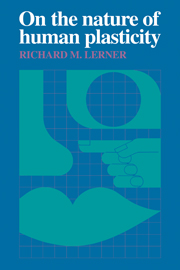Book contents
- Frontmatter
- Contents
- Foreword by Paul Baltes
- Preface
- 1 Perspectives on plasticity
- 2 The life-span view of human development: philosophical, historical, and substantive bases
- 3 Gene marking, recombinant DNA technology, and gene transfer: toward true gene therapy
- 4 Neuroanatomical bases of human plasticity
- 5 Human neurochemistry and the role of neurotransmitters
- 6 Evolutionary biology and hominid evolution
- 7 Comparative-developmental psychological bases of plasticity
- 8 Individual and group interdependencies
- 9 Toward future multidisciplinary efforts
- 10 Conclusions: On the limits of plasticity and the plasticity of limits
- References
- Author index
- Subject index
7 - Comparative-developmental psychological bases of plasticity
Published online by Cambridge University Press: 22 March 2010
- Frontmatter
- Contents
- Foreword by Paul Baltes
- Preface
- 1 Perspectives on plasticity
- 2 The life-span view of human development: philosophical, historical, and substantive bases
- 3 Gene marking, recombinant DNA technology, and gene transfer: toward true gene therapy
- 4 Neuroanatomical bases of human plasticity
- 5 Human neurochemistry and the role of neurotransmitters
- 6 Evolutionary biology and hominid evolution
- 7 Comparative-developmental psychological bases of plasticity
- 8 Individual and group interdependencies
- 9 Toward future multidisciplinary efforts
- 10 Conclusions: On the limits of plasticity and the plasticity of limits
- References
- Author index
- Subject index
Summary
Perhaps more so than in any of the other disciplinary areas we have considered, the concept of “levels” and the idea that reciprocal interactions among levels provide a basis of processes' plasticity have played central roles in theory and research in comparative–developmental psychology. Moreover, while not as historically preeminent, the use of these notions specifically in the study of human ontogeny (i.e., in developmental psychology per se) is also quite important (see R. Lerner, 1976; R. Lerner & Busch-Rossnagel, 1981).
Psychological levels and functional orders
Interest in the nature of species evolutionary changes, in interspecies differences in species evolutionary changes, and in criteria for discriminating among species levels led evolutionary biologists and comparative psychologists to study the concept of anagenesis (Yarczower & Hazlett, 1977). Although a controversial idea (Capitanio & Leger, 1979; Yarczower & Hazlett, 1977; Yarczower & Yarczower, 1979), most scientists agree that “anagenesis refers to the evolution of increased complexity in some trait” (Capitanio & Leger, 1979, p. 876). For example, Dobzhansky et al. (1977, p. 236) note that “anagenetic episodes commonly create organisms with novel characters and abilities beyond those of their ancestors” or simply that anagenesis is an “evolutionary advance or change.” Similarly, Jerison (1978, pp. 1–2) notes that an evolutionary analysis of progress from earlier to later species “is called ‘anagenetic’ and is about progressive evolution” and that in such an analysis “the objective is to identify grades in evolution.”
- Type
- Chapter
- Information
- On the Nature of Human Plasticity , pp. 105 - 121Publisher: Cambridge University PressPrint publication year: 1984



